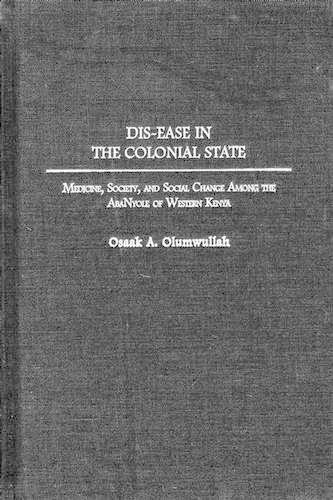
Dis-ease in the Colonial State: Medicine, Society, and Social Change Among the AbaNyole of Western Kenya
(Hardback)
Publishing Details
Dis-ease in the Colonial State: Medicine, Society, and Social Change Among the AbaNyole of Western Kenya
By (Author) Osaak Olumwullah
Bloomsbury Publishing PLC
Praeger Publishers Inc
30th July 2002
United States
Classifications
Tertiary Education
Non Fiction
Human biology
Anthropology
Biomedical engineering / Medical engineering
Social and cultural anthropology
Colonialism and imperialism
National liberation and independence
306.46109676
Physical Properties
Hardback
336
Description
Olumwullah examines disease, biomedicine, and processes of social change among the AbaNyole of Western Kenya and analyzes the introduction and use of biomedicine as a cultural tool of domination by British colonizers and the AbaNyole's reaction to this therapeutic tradition and its technologies. He argues that biomedicine is a tool that the colonizers used to think about the colonized. Through an examination of ideas about order and disorder in Nyole cosmology, Nyole experiences with new diseases and biomedical practices that were brought to bear on these diseases; and how these experiences and the meanings they produced transformed metaphors of disease, illness, and healing, this study argues that, just as colonialism was more than a quest for the construction of exploitative political and economic institutions, so was biomedicine more than a mere matter of scientific interest based on benevolent neutrality. By setting the terms of discourse between the West and the African culural environment, and by insinuating itself at the center of contestation over knowledge between a British science and African ways of knowing, colonial biomedical science turned the African body into a site of colonizing power and of contestation between the colonized and the colonizer. Narratives about the incidence of diseases like the plague were in themselves experiences of suffering that opened a window to how local knowledge about disease etiology and disease causation was produced among the AbaNyole. Instead of being passive victims of capitalistic forces of domination and exploitation, the Nyole confronted biomedicine as its assemblage of practices inhabited, passed through, transformed, conserved, or escaped the terrain sketched by a pre-European Nyole worldview. Conventioanl expectations about disease as misfortune were altered as colonialism came to be seen and experienced as a form of social death the AbaNyole had never before encountered.
Reviews
[a]n ambitious attempt to provide a history of the AbaNyole of Kenya during the colonial period, one that sees the AbaNyole as subject to much anxiety due to changes under colonial rule, many of which are manifested or perceived to be manifested in disease and ill-health....[r]ecommended for specialists on Western Kenya, or scholars of colonial Kenya who seek some information about health and healing as a counterpoint to the works of Marc Dawson, Agnes Odinga, and other scholars.-International Journal of African Historical Studies
"an ambitious attempt to provide a history of the AbaNyole of Kenya during the colonial period, one that sees the AbaNyole as subject to much anxiety due to changes under colonial rule, many of which are manifested or perceived to be manifested in disease and ill-health....recommended for specialists on Western Kenya, or scholars of colonial Kenya who seek some information about health and healing as a counterpoint to the works of Marc Dawson, Agnes Odinga, and other scholars."-International Journal of African Historical Studies
"[a]n ambitious attempt to provide a history of the AbaNyole of Kenya during the colonial period, one that sees the AbaNyole as subject to much anxiety due to changes under colonial rule, many of which are manifested or perceived to be manifested in disease and ill-health....[r]ecommended for specialists on Western Kenya, or scholars of colonial Kenya who seek some information about health and healing as a counterpoint to the works of Marc Dawson, Agnes Odinga, and other scholars."-International Journal of African Historical Studies
Author Bio
OSAAK A. OLUMWULLAH is Assistant Professor of History and an affiliate of Black World Studies at Miami University, Oxford, Ohio.
